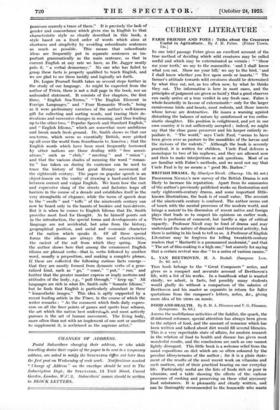CURRENT LITERATURE
IN one brief passage Fabre gives an excellent account of the true method of deciding which wild creatures may be called useful and which may be exterminated as vermin : " ' Show me your teeth,' we say to the mammifer, ' and I shall know what you eat. Show me your we say to the bird, ' and I shall know whether you live upon seeds or insects.' The farmer's attitude towards wild creatures should be determined by what they eat, not, as too often now, by what he thinks they eat. The information is here in most cases, and the principles of judgment are given so lucidly that a good observer can easily arrive at a true verdict in any fresh case. Fabre is whole-heartedly in favour of exterminatien only for the larger carnivorous birds and beasts, most rodents, and those insects whose larvae are destructive. He issues a warning against disturbing the balance of nature by uninformed or too enthu- siastic slaughter. His position is enlightened, and yet in our own country it is not sufficiently accepted ; indeed, we might say that the close game preserver and his keeper entirely re- pudiate it.. " The world," says Uncle Paul, " seems to have been given over as pasture to the mandibles of the larvae and the incisors of the rodents." Although the book is severely practical, it is written for children. Uncle Paul delivers a monologue to two of his nephews, and they are allowed now and then to make interjections or ask questions. Most of us are familiar with Fabre's methods, and we need not say that Uncle Paul is by no means a " good Mr. Barlow."






























































 Previous page
Previous page